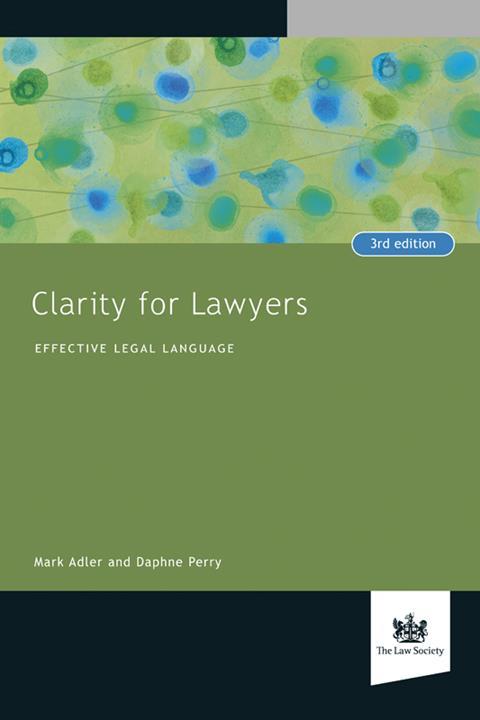Peter Todd, training partner at Hodge Jones & Allen LLP, explains why Clarity for Lawyers by Mark Adler and Daphne Perry, now in its 3rd edition, is a must-read for all lawyers.

Clarity for Lawyers, 3rd edition
Law Society Publishing
ISBN: 9781784460488
Price: £34.95 (£27.96 for members of the Law Management Section quoting code LAWMN)
For over 20 years, I have worked with trainee solicitors who have taken a civil litigation seat at my firm. They spend six months in their seat, often in the early stages of their training.
I have the joy of reading huge amounts of their drafting, critically appraising it and providing constructive feedback along with my amendments and suggestions. Sometimes, the returned draft has more of my comments written on it than their original words! Rarely do my trainees complain about getting feedback. Trainees are there to learn and they are happier with feedback than with none. Criticism helps them to learn, even if they may not ultimately adopt all my suggestions in their future practice. At the end of every training period, their feedback to me is that they have appreciated the time I have spent on critical appraisal of their work and helping them to improve their drafting skills.
If I could ask trainees to do one thing before starting their seat with me, it would be to carefully read and learn from Clarity for Lawyers by Mark Adler and Daphne Perry, now in its 3rd edition. It is one of those legal books every lawyer should have read.
Our work should be a delight to read, not an agonising and frustrating exercise to discern meaning
I read it myself, when I was starting my legal career and it had a real impact on me. It radically changed the way I approached the task of drafting - be it a humble attendance note, a letter of advice, a letter of claim, witness statement, statement of case, instructions to Counsel or any of the many documents which lawyers are required to draft. This book can help significantly improve the quality and effectiveness of drafting.
Trainee solicitors inevitably start their training after a long spell in academia where they mainly wrote for an audience of academic tutors. The academic audience is often able to readily comprehend complex sentence structure, and will be undaunted by it. On entering legal practice however, a new mindset is required. We cannot have our lay clients baffled by rambling sentence structure. We must avoid the potential for confusion in the documents we draft. Our work should be a delight to read, not an agonising and frustrating exercise to discern meaning and intention, where this is poorly expressed.
The revelation of this book is that by simplifying and clarifying drafting, you avoid mistakes and become more effective. Witness statements gain probative weight as the key evidence drives home the case with power. Letters of advice are concise, precise and easy to understand.
This latest edition offers updated knowledge to reflect current law and practice and its new co-editor, Daphne Perry, commercial barrister and legal trainer offers fresh and relevant insight. It also includes new training materials which would be useful for in-house legal training.
A good lawyer must have the ability to communicate effectively, to persuade, advocate, negotiate and explain. The latest edition of Clarity for Lawyers is a notable contribution to this.
















